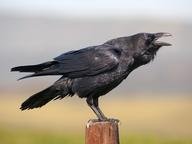Quiz Answer Key and Fun Facts
1. A brazen black fowl cajoles a lonely man, once upon a midnight dreary. Quoth what creature "Nevermore"?
2. In a requiem for what lady (elegized also in "The Raven") does a speaker excoriate the gossips who loved her wealth, hated her pride, and (when she fell in feeble health) were overjoyed she died?
3. In a poem expressing lost love, what eulogized maiden lived in a kingdom by the sea, and died from a chilling wind by jealous seraphs?
4. Under hazy October skies, the leaves crisp in the ghoul-haunted woodland of Weir, the narrator, having just quieted his soul, chances upon his lost love's tomb, and the mood is spoiled. Name the poem.
5. Poe composed several verses to the namesake of an idealized Trojan queen, though at least one was expressly to a real woman. And he dedicated them all to whom?
6. Poe inexplicably misquotes the Koran in what ode to an Islamic angel (whom he jibes at the end), whose beautiful voice mesmerizes even the stars?
7. A beautiful woman dies -- in a Poe verse? How shocking! -- and between tears the narrator explores the question of mortality. Not quite "The Snoozer", just what is the poem's name?
8. A king's stately manor in a green valley becomes an abject ruin filled with ghostly wraiths in what spooky poem that Poe later utilized in "The Fall of the House of Usher"?
9. Poe expertly neologizes a quotable crystalline delight of jingling, tinkling, clanging, and tintinnabulation that voluminously wells -- from the what?
10. Gaily bedight, a gallant knight journeyed long and expended his youth on a never-ending quest for a mythical land of gold. How was the elusive prize gaily benamed?
Source: Author
gracious1
This quiz was reviewed by FunTrivia editor
looney_tunes before going online.
Any errors found in FunTrivia content are routinely corrected through our feedback system.
